COWES, 3 August, 2023, James Boyd/RORC:
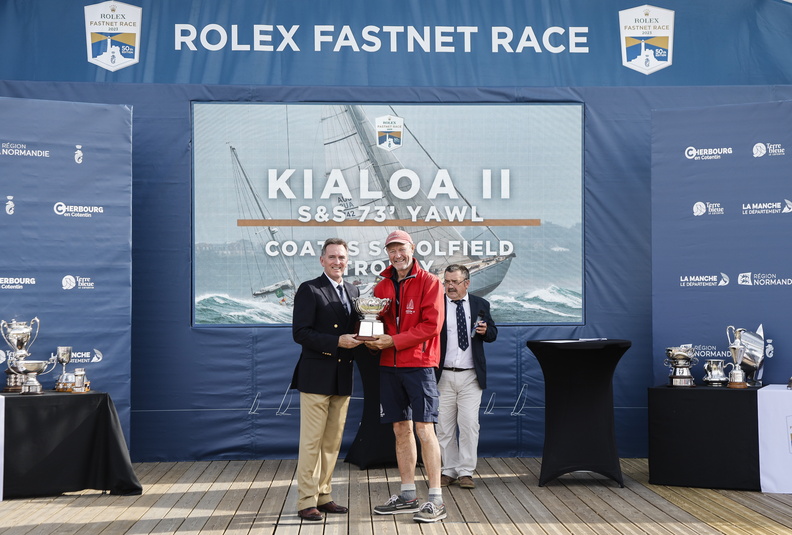
The 2023 Rolex Fastnet Race proved near perfect as a celebration of the 50th running of the Royal Ocean Racing Club’s flagship event. As a reminder of what a brutal race it can be, its giant fleet set off from the Solent into a southwesterly gale. Over the 695 miles to the Fastnet Rock and back, for a second time, to the finish in Cherbourg-en-Cotentin, the slower boats had to deal over four to five days with weather they might normally expect in twice that time, including strong winds associated with three cold fronts. The Fastnet Challenge Cup’s worthy winner on this occasion came from a class where much new hardware had been built especially for this special race.
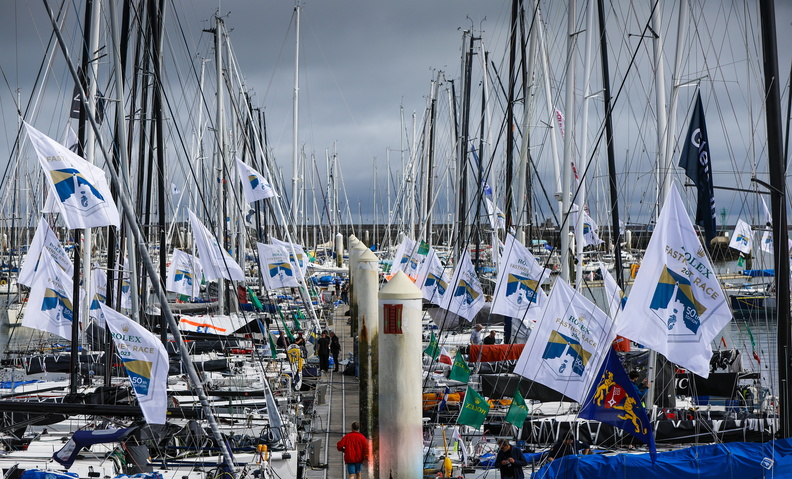
As ever, the fleet was hugely diverse, from the 32x23m Ultim trimarans, the world’s fastest offshore yachts, to the 60ft flying IMOCAs of the Vendée Globe, Class40s and multihulls to the bulk of the fleet in the IRC classes – ranging from maxis, to purpose-built 50-footers, to substantial turn-outs of manufacturer classes, a record doublehanded entry down to yacht club, association, family, sailing school and charter boat entries. It was again record-sized: while seven had set sail in 1925, this year 430 started (the previous record was 388 in 2019).
Come start day on Saturday 22 July crowds congregated by the Royal Squadron Yacht and along Cowes Green while others braved the wind and rain elsewhere on the Solent shore to see off this historic gathering. This year, to improve safety and avoid pre-start collisions, the RORC had increased the gap between start times from 10 to 20 minutes. Given the severe forecast they then reversed the IRC fleet start order with the largest/fastest first away and the gap between starts reduced to 15 minutes. Also, any boats OCS <30 seconds from the gun would receive a two-hour penalty. In the event there were no start line collisions but several penalties, notably among the Class40s when eight boats were called over.
Many compared the conditions to 2021 but in fact the wind on the line was less, at around 20 knots, although gustier; the overcast sky bringing intermittent rain. However as the bulk of the fleet negotiated Hurst Narrows, the Solent was in full ebb, the wind 30+ knots ahead of the front – combining to kick up a vicious wind-against-tide sea state. Over the course of the night, conditions deteriorated with winds gusting to 40+ knots (F9/severe gale) and a sharp 5-6m sea.
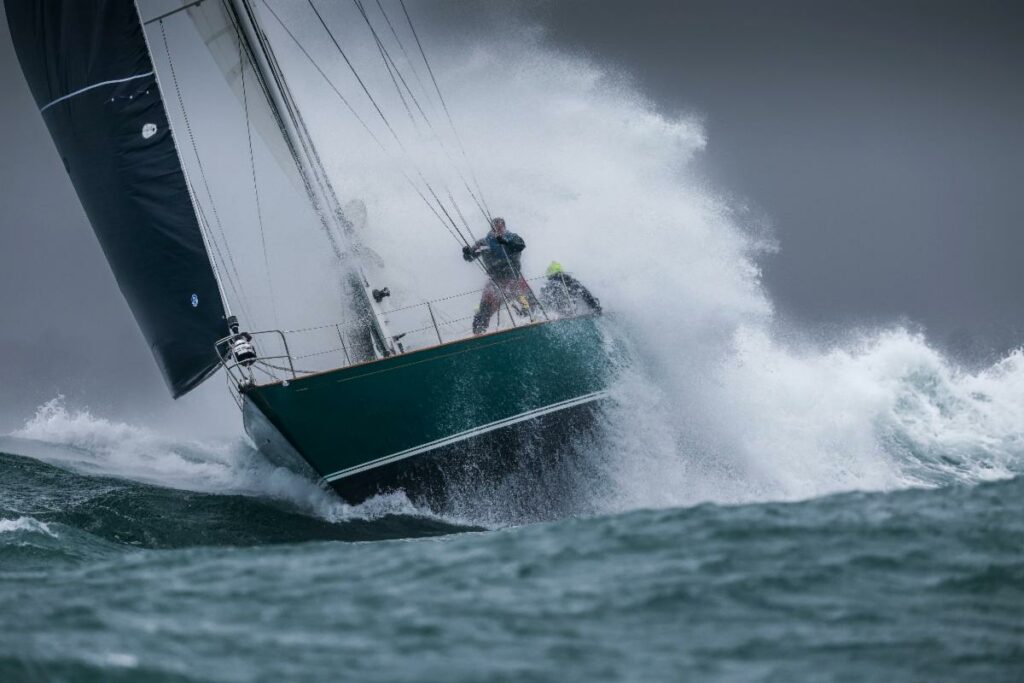
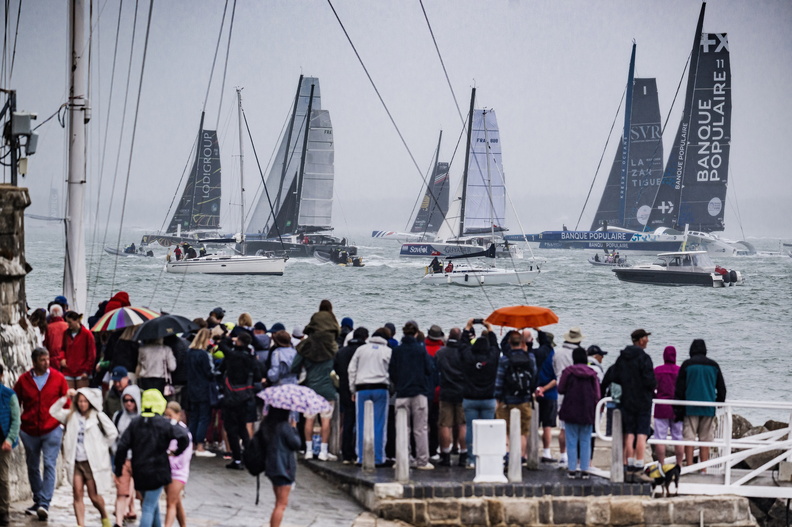
This year more competitors erred on caution, exiting the Solent via the calmer waters of the North Channel. Just south of the Needles at 17:00 the Sun Fast 3600 Vari, sailed by Yann Jestin and Romain Baggio, began sinking due to a severe leak in her engine compartment. The experienced doublehanders issued a May Day and took to their liferaft. Within 15 minutes of their discovery, Vari had sunk. As Ju Kyu stood by, after 10 minutes in their liferaft, they were recovered by the Yarmouth lifeboat and taken ashore.
In addition were four dismastings – Royal Naval Sailing Association’s Yoyo; Nick Martin’s Diablo, Bertrand Daniels’ Mirabelle and Tapio Lehtinen’s yawl Galiana, while others suffered steering and rigging issues and Richard Matthews’ Oystercatcher XXXV retired with structural deck issues.
There were also injuries. The Swanage all-weather lifeboat assisted a yacht where one crew had been knocked on the head and fallen overboard. Held on by their tether the crew had been recovered but was semi-unconscious. As the Coastguard helicopter was unable to lower a paramedic, instead the yacht headed for calmer waters where the casualty was transferred to the lifeboat and then to an ambulance in Poole Harbour.
Over the first night HM Coastguard answered 28 ‘incidents’ (albeit some involving the same boat) while in many other incidents HM Coastguard was not involved, including the mast foot breaking on race veteran Géry Trentesaux’s Long Courrier, which retired to Cowes.
Many crews showed excellent seamanship, choosing to seek shelter until conditions abated. Some continued, others did not. 24 hours into the race more than 100 yachts had retired. In the final tally 166 retired from this year’s race, roughly 39% of the fleet (compared to 45% in 2021 and 76% in 2007). Ironically the next day competitors were contemplating how to negotiate light winds.
Naturally the French pro offshore classes took the conditions in their stride. First home was the François Gabart-skippered 32m Ultim trimaran SVR Lazartigue in a new record time of 1 day 8 hours 38 minutes 27 seconds; 58 minutes 16 seconds ahead of the Armel le Cléac’h-skippered Banque Populaire X. Outbound, the two had split at the Casquets TSS with Banque Populaire heading due south of it. Just off the Cotentin peninsula where they tacked, le Cléac’h suffered a head injury when the screen protecting the helm position was shattered by a wave. From there on they were on the back foot. (See the full report HERE).
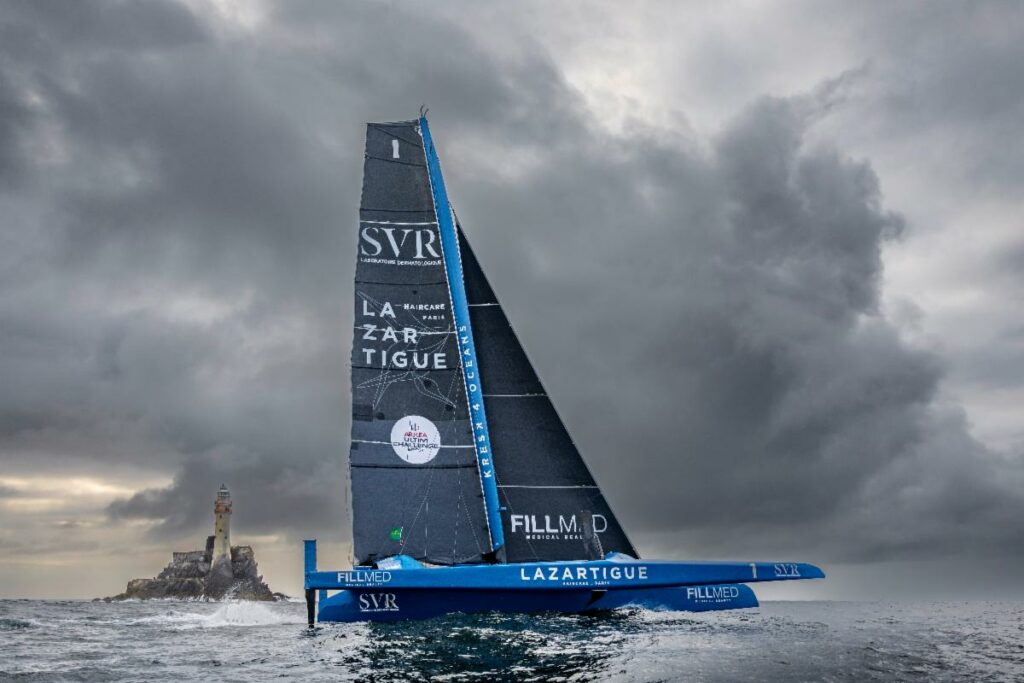
In the MOCRA multihull class, Erik Maris’ MOD70 Zoulou was first home in 2 day 5 hours, but close behind were the Ocean 50 trimarans. The lead duo in this enjoyed a high-octane match race: Viabilis was ahead at the Rock but Franco-Brit Luke Berry’s Le Rire Medecin Lamotte won by just 1 minute 26 seconds – the tightest finish in the race. (See the full report HERE).
However none of the tris could beat defending champion, Adrian Keller’s catamaran Allegra, on corrected time. The 84ft Nigel Irens-designed luxury fast cruiser (complete with five bathrooms) has become a heavy weather specialist and was hitting 30+ knots returning from the Rock. Ken Howery’s Gunboat 68 Tosca was second by almost two hours under corrected time. (See the full report HERE).
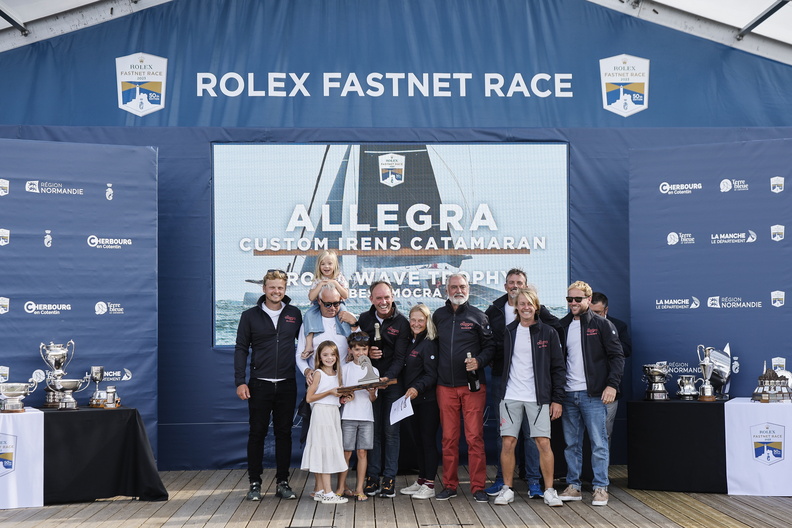

With the next Vendée Globe in 2024, there was a bumper fleet of 29 IMOCAs, including top skippers such as winner of the last Vendée Globe, Yannick Bestaven on Maître CoQ. There were also many extraordinary new examples, such as MACIF Santé Prévoyance, the brand new CDK-built Verdier design sailed by defending IMOCA champion Charlie Dalin and Ocean Race winner Pascal Bidegorry.
The newness of MACIF didn’t deter her crew from foiling upwind at 20+ knot speeds in the western Solent and later hitting 40 knots reaching back from the Rock. Leading for the majority of the race were Yoann Richomme and Yann Eliès on Paprec Arkea, but from Bishop Rock they were locked in an intense match race with MACIF. Ultimately, MACIF won in 2 days 7 hours 16 minutes 26 seconds, four minutes six seconds ahead of her rival, the top nine IMOCAs arriving within one hour, with three female skippers – Sam Davies (Initiatives Coeur), Clarisse Cremer (L’Occitane en Provence) and Justine Mettraux (Teamwork) – finishing fifth to seventh.
On elapsed time MACIF was exactly 15 minutes faster than Bryon Ehrhart’s Lucky, formerly George David’s multiple line honours winner Rambler 88 and the fastest IRC yacht – the first time an IMOCA has secured monohull line honours. MACIF also set a new monohull race record, bettering Skorpios’ time by 1 hour 17 minutes 29 seconds.

With Peter Morton’s Maxi 72 Notorious not starting due to the conditions, IRC Super Zero became a race between Lucky and two VO65s. The Polish Ocean Race team on Wind Whisper appeared to have won until receiving a 5% time penalty for using gear not on her IRC certificate. This handed IRC Super Zero to American Clarke Murphy and his team (including Ian Budgen, Mike Broughton and Dee Caffari) on the VO65 Team Jajo. (See full report HERE).
IRC Zero was bristling with both experience and race-winning hardware: Jean-Pierre Barjon’s Botin 65 Spirit of Lorina; Stefan Jentzsch’s Botin 56 Black Pearl; two-time winner Niklas Zennström’s CF520 Rán; Arto Linnervuo’s DSS-equipped Infiniti 52 Tulikettu; Max Klink’s Botin 52 Caro; Christopher Sheehan’s PAC52 Warrior Won; Ron O’Hanley’s Cookson 50 Privateer; Eric de Turckheim’s NMYD 54 Teasing Machine; the NMD 43 Albator and the new Carkeek 45 Ino Noir of RORC Commodore James Neville.
Caro edged ahead from the outset, arriving at the Rock 50 minutes ahead of Warrior Won. Under IRC she was 8 minutes 19 seconds ahead of Ino Noir, with Teasing Machine 23 minutes 10 seconds back in third. Heading back across the Celtic Sea, Caro, Warrior Won and Teasing Machine broke away and eventually it became a match race between Caro and Warrior Won, with Caro eventually beating her opponent by 2 hours 36 minutes with Albator completing the podium. Also putting in exceptional performances were two classic maxis finishing sixth and 12th in IRC Zero: Ermanno Traverso’s Stormvogel (the 1961 line honours winner) and the 1964 73ft S&S yawl Kialoa II, famously campaigned by Jim Kilroy and now by Paddy and Keith Broughton.
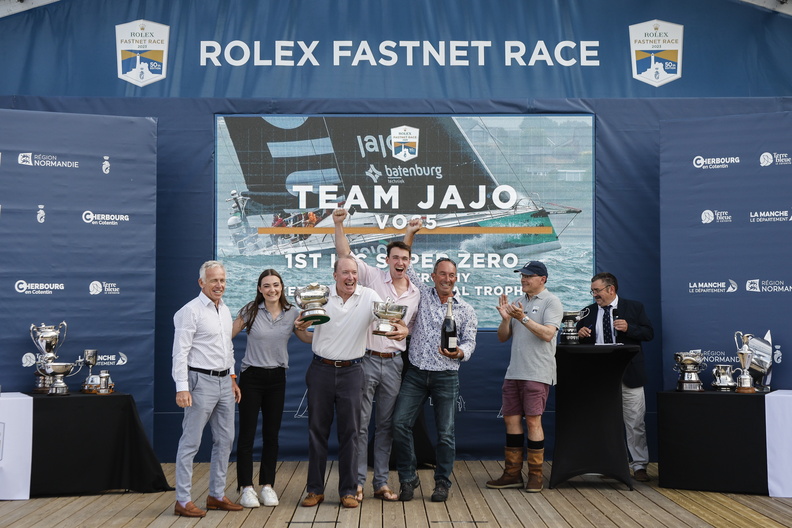
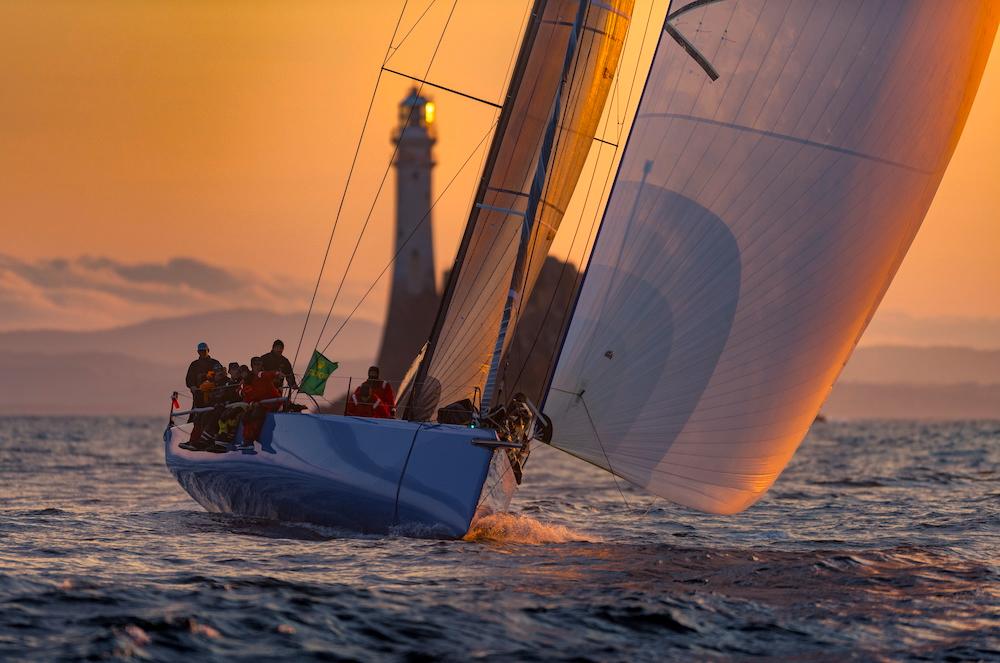

Like the IMOCAs, the Class40 turn-out of 21 included much new hardware sailed by accomplished skippers. Early leader was Italian favourite, Ambrogio Beccaria and Nicolas Andrieu’s Alla Grande Pirelli, with Amelie Grassi and Anne-Claire Le Berre on La Boulangere Bio a worthy second. At the Rock the Italians were 18 minutes 41 seconds ahead of La Boulangere Bio, with Erwan Le Draoulec’s Everial, being sailed four-up, a further 8 minutes 17 seconds behind. The first eight rounded within 25 minutes.
Back into the Channel the lead 40s fanned out with Alla Grande Pirelli defending the south, with Everial and William Mathelin-Moreaux and Pietro Luciani on Dékuple nearby. This trio would lead into Cherbourg, Everial in front having been first to gybe back to the northeast. The Verdier-designed Pogo S4 with her young crew (average age 26) won by 14 minutes, with the first six arriving within half an hour. Second home, Alla Grande Pirelli was relegated to sixth following her OCS, leaving Dékuple to take second with Andrea Fornaro and Corentin Douguet’s Influence2 third.
(See full report HERE).

In IRC One was a mix of well proven race winners and new hardware, notably 2017 overall winner Didier Gaudoux with his new MN35 Lann Ael 3. While he previously raced fully crewed, this time Gaudoux was doublehanded with top shorthanded sailor Erwan Tabarly (nephew of Eric). Having made some modifications to their defending champion, Tom Kneen’s JPK 1180 Sunrise III had jumped a class to IRC One where they would race sistership Ed Bell’s Dawn Treader. Also returning was 2015 winner, Géry Trentesaux on the Sydney 43 GTS Long Courrier; Jacques Pelletier’s 41ft L’Ange de Milon and Gilles Fournier and daughter Corinne Migraine on the J/133 Pintia, lightened and optimised with bigger spinnakers.
At Land’s End, Sunrise was leading Dawn Treader, followed by Pintia and the Humphreys 39 Ginkgo, skippered by German Dirk Clasen, with Sunrise III ahead of Pintia under IRC. At the Rock Pintia was 36 minutes ahead of Sunrise III, followed by Dawn Treader. On the run back the lead four extended. Ginkgo and Pintia performed better to the east, leading Sunrise III into Bishop Rock. Into the Channel with the wind going light Ginkgo split heading into the Cornish coast as those astern were closing in with pressure. Gingko was first home, but under IRC Pinta held first, 1 hour 21 minutes ahead of Sunrise III. While the slenderer 2005-vintage J/133 was superior upwind, lightening Pintia had improved her downwind performance and she had done well to fend off her lighter, higher-rated opponent. (See full report HERE).
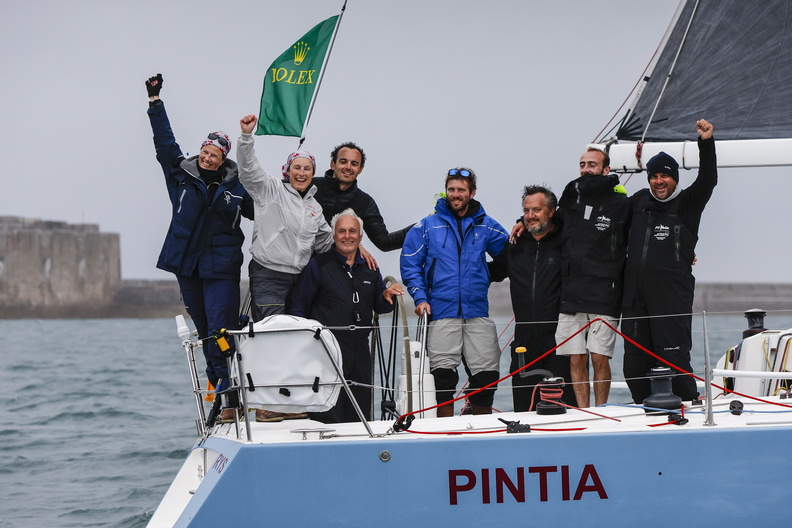
IRC Two and Three both had two overriding characteristics. They included large ‘manufacturer’ fleets providing a competitive ‘race within a race’: In IRC Two there were sixteen Sun Fast 3600s, thirteen JPK 1030s and six JPK 1080s. Both were also dominated by doublehanded entries.
In IRC Two, at Start Point the Sun Fast 3600 Fujitsu British Soldier skippered by Major Henry Foster and Philippe Girardin’s J/120 Hey Jude had pulled out a nice lead. Taking the east route past the Land’s End TSS, Hey Jude pulled ahead and Sams White and North on the JPK 1010 Mzungu! and Maxime Mesnil and Hugo Feydit on the J/99 Axe Sail caught up. Rounding the Rock in light winds, Hey Jude was leading Axe Sail and Mzungu! both on the water and corrected time with more than an hour separating them.
Back into the Channel the leaders fanned out with Hey Jude still leading, Fujitsu British Solder losing out in the north and Karavel holding the south. Southwest of the Lizard, Hey Jude’s hard-won lead evaporated, the 2006 J/120 not enjoying the stronger downwind conditions as much as her more modern, stable rivals, with Thomas Bonnier and David Prono’s JPK 1030 Juzzy and Jean-Francois Hamon and Alex Ozon on the Sun Fast 3300 Festa 2 rolling her. Festa 2 was first home ahead of Juzzy and Hey Jude. Under IRC, France owned the podium with Juzzy 1 hour 22 minutes ahead of Axe Sail, 22 minutes ahead of Karavel. Hey Jude finished fifth while Festa 2 was eighth having been penalised for being OCS. Of the podium finishers only Karavel was fully crewed. (See full report HERE).

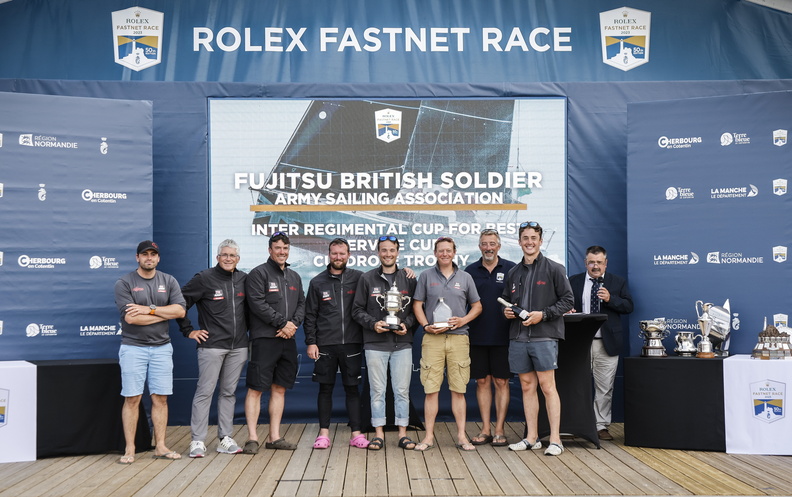
In IRC Three British duo Tim Goodhew and Kelvin Matthews made a strong start on the Sun Fast 3200 Cora. Short tacking around the West Country headlands, Cora led around the Lizard ahead of Jérôme Fournier Le Ray’s A-35 Locmalo, Australians Jules Hall and Jan Scholten on the J/99 Disko Trooper-Contender Sailcloth and the JPK 1010s Loeiz Cadiou and Stéphane Bodin’s Tracass, and Romain Gibon and Alban Mesnil’s Les P’tits Doudous en Duo.
After passing east of the Land’s End TSS, Locmalo and Cora were initially laying as they crossed the Celtic Sea, with the French boat edging ahead and those astern catching to form a lead pack of nine. At the Rock Locmalo led Cora on the water by almost 15 minutes, with Ludovic Menahes and David le Goff’s JPK 1010 Adeosys another 42 minutes behind. However under IRC Cora was still 37 minutes ahead of Adeosys with Les P’tits Doudous en Duo up to third and Locmalo fifth.
Downwind in big breeze to Bishop Rock, the chasing pack again closed. Most left the westerly Bishop Rock TSS to port but Juan Emigdio Bedia Cagigal’s Spanish crew on the J/99 Gorilon gained going east of it. Into the Channel, in strong southwesterlies the French boats seemed better able to handle the challenging conditions than Cora, and under IRC Les P’tits Doudous en Duo won by 17 minutes from Tracass, with Adeosys 25 minutes behind in third, leaving Cora in fourth and Locmalo fifth. After Pintia, Les P’tits Doudous en Duo added more silverware to La Société des Régates du Havre’s trophy cabinet.
Les P’tits Doudous en Duo also won IRC Two-Handed ahead of Tracass and Juzzy. France claimed the top five spots with Cora sixth ahead of US doublehanded veterans Chris and Justin Wolfe on their Sun Fast 3300 Red Ruby and talented father-daughter combo Jim and Ellie Driver 10th on their Sun Fast 3300 Chilli Pepper. (See full report HERE).

Having been robbed of the class win in 2021, François Charles and his Morlaix-based marine industry friends on Sun Hill III were the IRC Four favourites. True to form, his Dehler 33 CR led into Weymouth Bay as Marc Willame and Antoine Jeu doublehanded on JPK 960 Elma headed offshore ahead of Belgian Jon Toussein’s Swan 38 Leda. By Lyme Bay, Sun Hill III was already nine miles ahead on the water but approaching Start Point, Elma had closed by heading offshore.
Due to an anticipated major left shift, only the three leaders sailed east of the Land’s End TSS. Others, led by Chris Choules’ Sigma 38 With Alacrity, left it to starboard and some, like Niek Spiljard’s X-332 Vanilla, went even further west, leaving the Isle of Scilly to starboard. The Celtic Sea crossing was trying on the Tuesday with no breeze, leaving them floundering for hours. At the Fastnet Rock Sun Hill III led Elma and With Alacrity on the water and under IRC.
For the leg to Bishop Rock, the wind had backed into the SW/S leaving the leaders on a tight reach southeast. Here With Alacrity was being challenged by Leda and Samuel Dumenil and Antoine Runet on the JPK 960 Casamyas, but comfortably 15 miles ahead of the next group.
Once into the Channel a broad reach to the finish left the rich getting richer. Ultimately Sun Hill III arrived in 4 days 20 hours 54 minutes, correcting out to 3 hours 44 minutes ahead of Elma with With Alacrity third, 13 minutes behind. Among many noteworthy performances was that of Maluka, Australian Sean Langman’s 9m 1932 vintage gaff-rigged, 10th in class under IRC. (See full report HERE).
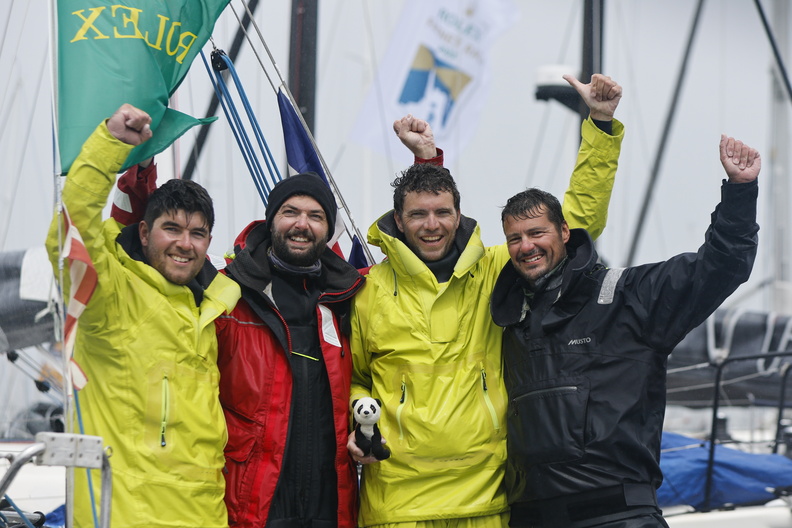
The race’s overall winner and recipient of the Fastnet Challenge Cup was Max Klink’s Caro, the IRC Zero winner. For the race the Swiss team had recruited British tactician Adrian Stead, previously a two-time winner of the race with Niklas Zennström’s Rán team. The rest of Caro’s crew were Justin Ferris, Wade Morgan, Andrew Green, Andrew McCorquodale, Cian Guilfoyle, Harry Hall, James Paterson, Jonno Swain, Ryan Godfrey and William John Parker.
Klink commented: “This is a legendary group of sailors, with whom I have been fortunate to sail for a few years now. When we set out on this race I never expected we could win. It’s a dream come true – all the more special as this is the 50th edition of such an iconic race.” (See full report HERE) and HERE.
Disappointingly there were no British winners. Of the 12 classes, France won eight, Switzerland three and the USA one.
Summarising the 50th edition, RORC Racing Manager Steve Cole said: “This Rolex Fastnet Race had everything: a superb range of boats from all over the world, and challenging conditions, a powerful reminder that this event may happen in mid-July but can still have teeth. I would like to thank Rolex and our partners in Cherbourg-en-Cotentin for their continued support. Special mention should be made of the rescue services on both sides of the Channel for their bravery and professionalism looking after our competitors. We look forward to seeing you all again for another special edition in 2025, which will coincided with the centenary of both the race and the Royal Ocean Racing Club.”
James Boyd/RORC
For full results and all the news, photos, videos and reports, please go to the Rolex Fastnet Race website: https://www.rolexfastnetrace.com/ and race social media channels.

























